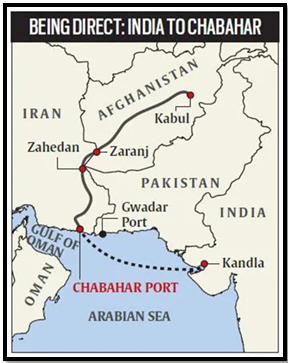THE MISSING LINK IN IMEC, AS SHOWN BY GAZA WAR
SYLLABUS:
- GS 2: Bilateral, regional and global groupings and agreements involving India and/or affecting India’s interests.
Focus:
- India and Iran finally signed a 10-year long-term bilateral contract for the operation of Chabahar Port
Source: IE
The India-Middle East-Europe Corridor (IMEC) and the Chabahar Port projects are pivotal initiatives aimed at enhancing regional connectivity and economic integration. While these projects promise significant benefits, recent conflicts such as the Gaza war have exposed critical vulnerabilities. Addressing these challenges is essential for realizing the full potential of these ambitious infrastructure projects.
The Importance of the IMEC and Chabahar Port Projects
Chabahar Port Agreement
- Bilateral Contract Signing: India and Iran signed a 10-year contract for the operation of Chabahar Port on May 13, 2024.
- Key Players: The agreement was between the Indian Ports Global Limited and the Port and Maritime Organisation of Iran.
- Economic Significance: Chabahar Port links India with Afghanistan and Central Asian countries, enhancing regional connectivity.
- Strategic Importance: The port serves as a crucial economic route, beyond just bridging India and Iran.
- Ministerial Endorsement: India’s Ports, Shipping and Waterways Minister, Sarbananda Sonowal, emphasized the port’s strategic value.
IMEC Project Overview
- Inception: The IMEC was signed during the G-20 summit in New Delhi on September 9, 2023.
- Participating Nations: European Union, France, Germany, India, Italy, Saudi Arabia, UAE, and the United States are key stakeholders.
- Project Goals: The IMEC aims to boost economic development through enhanced connectivity and integration between Asia, the Arabian Gulf, and Europe.
- Corridor Structure: It comprises an east corridor (India to Arabian Gulf) and a northern corridor (Arabian Gulf to Europe).
- Transportation Network: The project includes maritime, road, and railway networks, enhancing the reliability and cost-effectiveness of cross-border transit.
Benefits of IMEC
- Trade Efficiency: The IMEC is expected to reduce transit time and costs for goods between India and Europe by 40% and 30%, respectively.
- Supply Chain Security: The 4,800-kilometer corridor aims to secure regional supply chains and improve trade accessibility.
- Alternative Route: It provides an alternative to the Suez Canal, bypassing overland obstacles like Pakistan.
- Economic Integration: The corridor fosters economic integration across regions, stimulating development.
- BRI Counterpart: The IMEC serves as a counter to China’s Belt and Road Initiative, with significant backing from the U.S.
Challenges Highlighted by the Gaza War
- Project Delay: The Gaza war, starting on October 7, 2023, stalled the IMEC project’s progress.
- Security Concerns: Houthis in Yemen have blocked access to the Red Sea, targeting ships of Israel and its allies.
- Route Disruptions: Conflicts in the Persian Gulf and the Strait of Hormuz have threatened key transit routes.
- Impact on Ports: Ports in Israel, such as Eilat and Haifa, have faced significant disruptions due to the war.
- Insurance and Shipping Costs: The conflict has increased shipping times and insurance costs, affecting regional trade.
Strategic Adjustments
- Oman’s Potential: Oman’s ports, opening into the Arabian Sea, offer a strategic alternative to the Persian Gulf ports.
- Historical Trade Links: Oman has a long history of trade with India, making it a viable partner for the IMEC.
- Political Stability: Oman maintains good relations with regional stakeholders, including Israel.
- Egypt’s Inclusion: Extending the IMEC to Egypt’s Mediterranean ports can provide a safe and direct sea route to Europe.
- Balancing Regional Dynamics: Including Egypt in the IMEC can enhance regional stability and economic balance.
Future Prospects
- Conflict Resilience: Incorporating Oman and Egypt into the IMEC can insulate the project from future conflicts.
- Regional Integration: The IMEC builds on the Abraham Accords, promoting reconciliation and integration in West Asia.
- Economic Potential: The corridor can serve as a significant economic counterbalance to China’s BRI.
- Infrastructure Investment: Continued investment in infrastructure is crucial for the IMEC’s success.
- Strategic Importance: The IMEC remains a vital initiative for enhancing global trade connectivity and economic growth.
About Chabahar Port
|
Conclusion
The IMEC and Chabahar Port projects hold immense promise for transforming regional trade and connectivity. However, the disruptions caused by geopolitical conflicts underscore the need for strategic adjustments to ensure resilience. Incorporating additional partners like Oman and Egypt can provide the necessary stability and security, making these projects robust against future uncertainties.
Source:The Hindu
Mains Practice Question:
“Discuss the significance of the India-Middle East-Europe Corridor (IMEC) and the Chabahar Port projects in enhancing regional connectivity and economic integration. Analyze the challenges posed by recent geopolitical conflicts and suggest strategic measures to address these vulnerabilities.”
Associated Articles:




